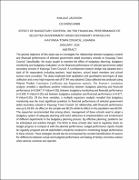| dc.description.abstract | ABSTRACT
The general objective of this study was to investigate the relationship between budgetary control and financial performance of selected government aided secondary schools in Kayunga Town Council. Specifically, the study sought to examine the effect of budgetary planning, budgetary monitoring and budgetary evaluation on the financial performance of selected government aided secondary schools in Kayunga Town Council. A correlational research design was adopted and a total of 94 respondents including teachers, head teachers, school board members and school bursars were consulted. The study employed both qualitative and quantitative techniques of data collection and a very high response rate of 97.9% was obtained. Data collected was analyzed using Pearson Product Correlation Coefficient and Regression analysis. The Pearson’s correlation analysis revealed a significant positive relationship between budgetary planning and financial performance (r=0.8047, P-Value<0.05), between budgetary monitoring and financial performance (r=0.939, P-Value<0.05) and between budgetary evaluation and financial performance (r=0.877, P-Value<0.05). Of the three variables, a multiple regression analysis revealed that budgetary monitoring was the most significant predictor to financial performance of selected government aided secondary schools in Kayunga Town Council. Its relationship with financial performance was up to 93.9%, its effect on the sample was 88.2% while its effect on the population was 88.0%. The researcher recommended that among others, management of these schools need to adopt a budgetary system of adequate planning with strict adherence to implementation and involvement of different departments in the budgetary planning process. By effective planning, problems can be anticipated and solution thought. The BOG in these schools also need to regularly check on budget progress to compare it with the planned performance, budget performance reports should be regularly prepared and all stakeholders should be involved in monitoring budget performance in these schools. These strategies should also be accompanied by constant identification of reasons for differences between actual and budgeted performance and taking of timely corrective actions when adverse variances are reported. | en_US |

